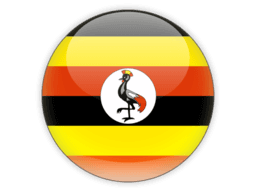
Regions of Uganda
Explore 4 regions
Cities of Uganda
Discover 50 cities across 4 regions
Central Region(18)
Eastern Region(11)
Uganda is a landlocked country in East Africa bordered by Kenya to the east, Tanzania to the south, Rwanda to the southwest, the Democratic Republic of Congo to the west, and South Sudan to the north. The capital city is Kampala.
With a population of approximately 45 million people, Uganda is one of the most ethnically diverse countries in Africa, with over 50 different indigenous languages spoken. The official languages are English and Swahili.
Uganda has a diverse economy with agriculture being the largest sector, accounting for around 24% of the country's GDP. Uganda is known for its production of coffee, tea, cotton, and tobacco. Other important sectors of the economy include industry, services, and tourism.
Uganda is home to a variety of wildlife, including the endangered mountain gorillas, which can be seen in the Bwindi Impenetrable Forest National Park and Mgahinga Gorilla National Park. Other popular national parks include Murchison Falls National Park, Queen Elizabeth National Park, and Kibale National Park, known for its chimpanzees.
Uganda has a diverse cultural heritage, with more than 50 different ethnic groups, each with its own customs and traditions. The Buganda Kingdom is the largest and most influential traditional kingdom in the country, with a rich cultural history.
Uganda gained independence from Britain in 1962, and since then has experienced political instability and economic struggles. However, recent years have seen improvements in both areas, with Uganda becoming a stable democracy and one of the fastest-growing economies in Africa.
Telephone Code
256
Local Emergency Phone
112 (cell phone), 999 (fixed)
Vaccinations
An International Certificate of Vaccination for yellow fever is required for travelers arriving from countries with a risk of yellow fever transmission and for travelers having transited through the airport of a country with risk of yellow fever transmission. See WHO recommendations. On 21 March 2022, the US Centers for Disease Control and Prevention (CDC) issued a Travel Alert for polio in Africa; Uganda is currently considered a high risk to travelers for polio; the CDC recommends that before any international travel, anyone unvaccinated, incompletely vaccinated, or with an unknown polio vaccination status should complete the routine polio vaccine series; before travel to any high-risk destination, CDC recommends that adults who previously completed the full, routine polio vaccine series receive a single, lifetime booster dose of polio vaccine.
Climate
Tropical; generally rainy with two dry seasons (December to February, June to August); semiarid in northeast
Currency (Code)
Ugandan shillings (UGX)
Electricity/Voltage/Plug Type(s)
240 V / 50 Hz / plug types(s): G
Major Languages
English, Ganda or Luganda, other Niger-Congo languages, Nilo-Saharan languages, Swahili, Arabic
Major Religions
Protestant 45.1%, Roman Catholic 39.3%, Muslim 13.7%
Potable Water
Opt for bottled water
International Driving Permit
Suggested
Road Driving Side
Left
Tourist Destinations
Bwindi Impenetrable National Park; Kibale Forest National Park; Queen Elizabeth National Park; Ziwa Rhino Sanctuary; Murchison Falls National Park; Tombs of Bugana Kings; Uganda Wildlife Conservation Center
Major Sports
Soccer, rugby, basketball, athletics (track and field), boxing
Cultural Practices
Walking over pots, especially those containing food, is considered very rude.
Tipping Guidelines
It is not customary to tip for service in hotels and bars. It is common to tip your driver and guide on a safari or hike, as well as the porter and cook that accompanies the group. Conventionally, $10-20 (USD) per person per day would be a fair benchmark.
Souvenirs
Musical instruments, wood carvings, woven goods and batik fabric, locally made jewelry, local teas and coffees
Traditional Cuisine
Matoke (or Matooke) — unripe boiled, steamed, or roasted bananas typically mashed and paired with vegetable sauces, ground peanuts, or meat
Geography
Area
total: 241,038 sq km
land: 197,100 sq km
water: 43,938 sq km
Climate
tropical; generally rainy with two dry seasons (December to February, June to August); semiarid in northeast
Natural resources
copper, cobalt, hydropower, limestone, salt, arable land, gold
People and Society
Population
47,729,952 (2023 est.)
Ethnic groups
Baganda 16.5%, Banyankole 9.6%, Basoga 8.8%, Bakiga 7.1%, Iteso 7%, Langi 6.3%, Bagisu 4.9%, Acholi 4.4%, Lugbara 3.3%, other 32.1% (2014 est.)
Languages
English (official language, taught in schools, used in courts of law and by most newspapers and some radio broadcasts), Ganda or Luganda (most widely used of the Niger-Congo languages and the language used most often in the capital), other Niger-Congo languages, Nilo-Saharan languages, Swahili (official), Arabic
Religions
Protestant 45.1% (Anglican 32.0%, Pentecostal/Born Again/Evangelical 11.1%, Seventh Day Adventist 1.7%, Baptist .3%), Roman Catholic 39.3%, Muslim 13.7%, other 1.6%, none 0.2% (2014 est.)
Population growth rate
3.22% (2023 est.)
Government
Government type
presidential republic
Capital
name: Kampala
Economy
Economic overview
low-income, primarily agrarian East African economy; COVID-19 hurt economic growth and poverty reduction; lower oil prices threaten prior sector investments; endemic corruption; natural resource rich; high female labor force participation but undervalued
Real GDP (purchasing power parity)
$103.007 billion (2021 est.)
Real GDP per capita
$2,200 (2021 est.)
Agricultural products
sugar cane, plantains, cassava, maize, sweet potatoes, milk, vegetables, beans, bananas, sorghum
Industries
sugar processing, brewing, tobacco, cotton textiles; cement, steel production
Exports
$6.177 billion (2021 est.)
Exports - partners
United Arab Emirates 58%, Kenya 9% (2019)
Exports - commodities
gold, coffee, milk, fish and fish products, tobacco (2019)
Imports
$10.705 billion (2021 est.)
Imports - partners
China 19%, India 17%, Kenya 16%, United Arab Emirates 7%, Japan 5% (2019)
Imports - commodities
packaged medicines, aircraft, delivery trucks, cars, wheat (2019)
International Airports in Uganda
Discover 4 major airports serving Uganda
Mark Uganda as Visited
Add Uganda to your personal travel map and track your journey around the world. Share your adventures and see your progress grow!